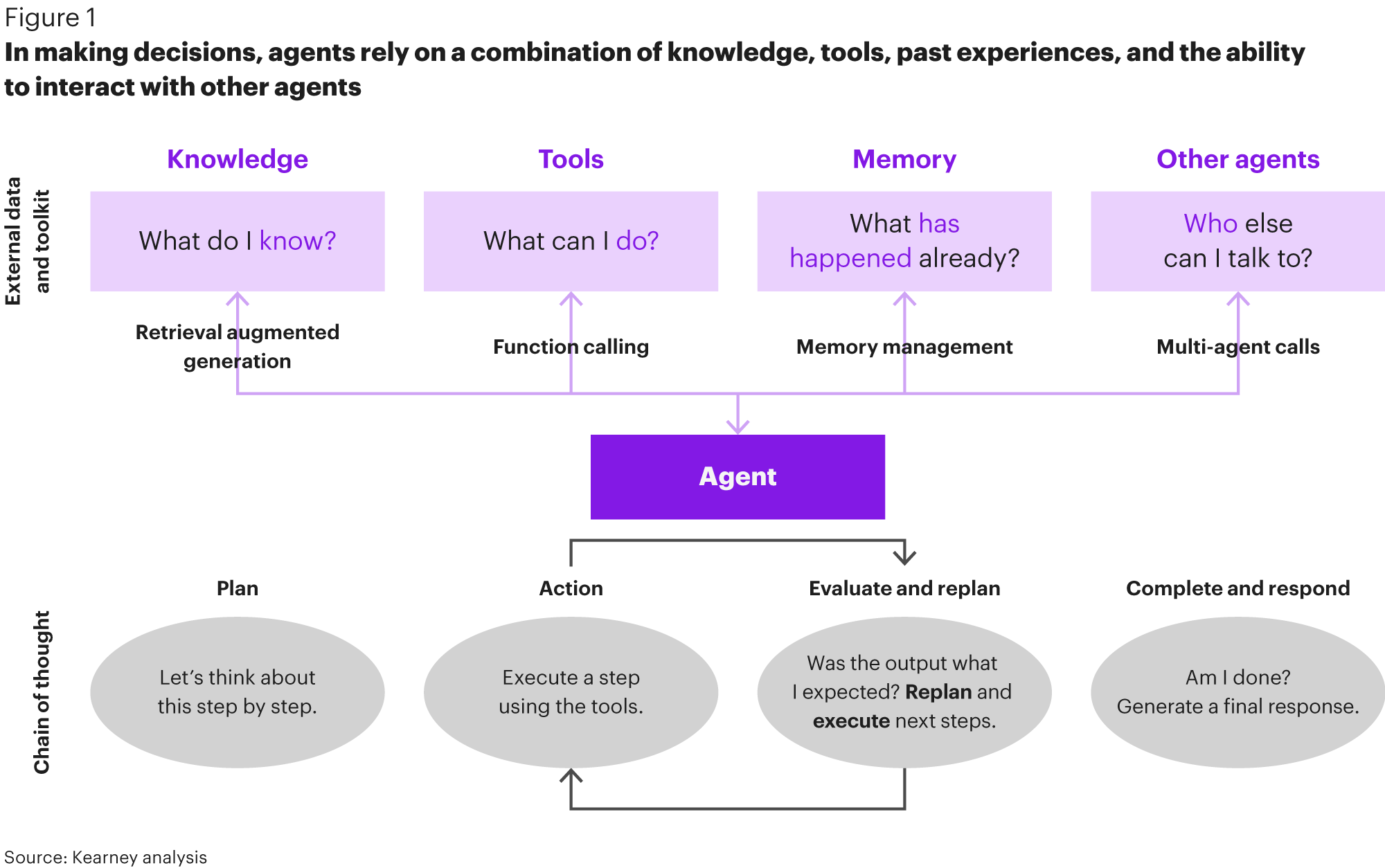What Are AI Agents and Why is Everyone Talking About Them?


In recent years, AI agents have become a buzzword in the tech world. But what exactly are AI agents, how do they work, and why is everyone so excited about them? This blog post breaks down everything you need to know about AI agents, from their core components to how they differ from traditional AI models. By the end, you'll have a solid understanding of AI agents and how to run them locally on your own machine.
What Are AI Agents?
AI agents are autonomous systems powered by artificial intelligence that can complete tasks, make decisions, and adapt to new information on their own. They go beyond simply responding to commands—they can take actions and make decisions to achieve a goal.
For example, imagine a travel planning agent. Rather than just recommending flights, hotels, and activities, an AI agent can book your flights, handle delays, make hotel reservations, and even plan your daily itinerary. It's not just providing information; it's taking concrete actions to complete tasks on your behalf.
Key Properties of AI Agents
There are three key characteristics that define AI agents:
- Autonomy – AI agents can operate independently within a set framework, executing tasks without constant human intervention.
- Goal-Oriented – AI agents are designed with a specific outcome in mind. They focus on completing tasks or solving problems, often excelling in a particular domain.
- Environment Awareness – AI agents can respond to real-world data, including physical or digital inputs, and can adapt their behavior accordingly. They can even store memory to keep track of previous interactions or actions.
How Do AI Agents Work?
AI agents are powered by a combination of advanced technologies, which include the following four core components:
- The Core AI Model (LLM)
At the heart of every AI agent is an AI model—often a large language model (LLM) like GPT, Llama, or others. This is the "brain" of the agent, responsible for understanding language, reasoning, and problem-solving. - Tool Usage
AI agents use external tools and APIs to accomplish tasks. These might include everything from querying databases to interacting with calendar apps. They are more than just information generators; they can actively engage with the digital world to complete tasks. - Memory
Some AI agents have short-term or even long-term memory. This allows them to remember the context of a task or conversations, adjusting their actions as necessary based on past interactions. - Feedback Loop
A crucial element of AI agents is the feedback loop, which allows the system to analyze its actions and adapt. If one approach fails, the agent can reevaluate and attempt a different method to reach the goal.
The Decision-Making Framework
AI agents rely on decision-making frameworks, such as reinforcement learning or rule-based logic, to guide their actions. This framework helps break down a larger goal into smaller, actionable steps.
- Goal Definition - The agent begins by defining or accepting a user-provided goal.
- Task Decomposition - It breaks the goal down into smaller, actionable tasks—just like a human would when solving a problem.
- Tool and Action Selection - The agent chooses the right tools and actions for each task, such as using a weather API to check conditions.
- Feedback and Adaptation - After completing an action, the agent evaluates whether it has moved closer to the goal and adjusts accordingly.
- Memory Management - The agent tracks its progress, remembers previous actions, and uses this context to make more informed decisions.
- Prioritization and Conflict Resolution - In cases where multiple actions compete, the agent weighs its options and resolves conflicts to ensure the most effective approach.
- Reinforcement Learning - The agent learns over time, receiving rewards for successful tasks and adjusting its approach to improve efficiency.
Exploring the Core Components of AI Agents
AI agents are powered by a combination of advanced technologies that work together seamlessly to enable their autonomous and goal-oriented behavior. Below is a detailed breakdown of the core components that form the foundation of AI agents:
1. The Brain: Large Language Models (LLMs)
At the heart of every AI agent is an advanced large language model (LLM), such as GPT, Llama, or others. These models process and generate human-like text, enabling the agent to:
- Understand natural language inputs.
- Generate coherent and context-aware responses.
- Reason through complex tasks and problems.
The LLM acts as the agent's "thinking engine," providing the intelligence required for decision-making and interaction with users or systems.
2. Tools and APIs for Execution
AI agents extend their functionality by integrating with external tools, software, and APIs. These enable the agent to perform actions in the real or digital world. For example:
- Calendar Management: Using APIs to schedule events or send reminders.
- Data Retrieval: Querying databases or scraping websites for information.
- File Manipulation: Uploading, downloading, and analyzing files.
These tools are essential for transforming the agent from a passive information provider to an active problem-solver capable of executing tasks.
3. Memory: Short-Term and Long-Term
Memory allows AI agents to maintain context and adapt to new situations dynamically.
- Short-Term Memory: Tracks interactions within a session to ensure the agent can follow a conversation or sequence of tasks.
- Long-Term Memory: Stores data about past interactions, user preferences, and completed tasks to provide personalized and consistent experiences.
This memory is critical for complex workflows, ensuring the agent understands the current context while retaining relevant history.
4. Feedback Loops for Iterative Improvement
The feedback loop is one of the most vital components of an AI agent, enabling it to continuously evaluate and refine its actions. Here's how it works:
- The agent executes an action (e.g., sending an email or querying a database).
- It evaluates the result to determine if it successfully met the goal.
- If unsuccessful, the agent adjusts its strategy and tries an alternative approach.
This iterative process ensures that the agent learns and adapts, improving its efficiency and accuracy over time.
5. Decision-Making Frameworks
The decision-making framework is the guiding structure that directs the agent's actions. It integrates inputs from the LLM, tools, memory, and feedback loop to make informed choices. These frameworks can include:
- Reinforcement Learning: Using trial and error to optimize actions based on rewards.
- Rule-Based Systems: Following predefined logic to achieve specific outcomes.
By breaking down tasks into manageable subtasks, prioritizing actions, and resolving conflicts, the decision-making framework ensures the agent operates effectively even in complex scenarios.
6. Context Awareness and Adaptability
AI agents are environment-aware, meaning they can perceive and respond to their surroundings—whether through online data or physical sensors. For instance:
- Online Context: Adjusting actions based on updated data or user feedback.
- Physical Context: Responding to sensor inputs, such as temperature changes in IoT devices.
This ability to adapt ensures the agent remains relevant and effective in dynamic environments.
Why AI Agents Are the Future
AI agents are at the forefront of AI development. With the ability to act autonomously, solve complex problems, and adapt to new information, they are transforming industries and offering new ways of solving real-world problems. Whether it's for personal use or business applications, AI agents have the potential to streamline workflows, improve efficiency, and automate tasks that would otherwise require human intervention.
Conclusion
AI agents are revolutionizing how we interact with artificial intelligence. By combining AI models, memory, tool usage, and continuous feedback, these agents can complete complex tasks autonomously. If you're curious about experimenting with AI agents, platforms like Anything LLM allow you to run them locally and privately on your computer. As technology evolves, the role of AI agents in automation and problem-solving will continue to grow, providing endless possibilities for both personal and professional use.